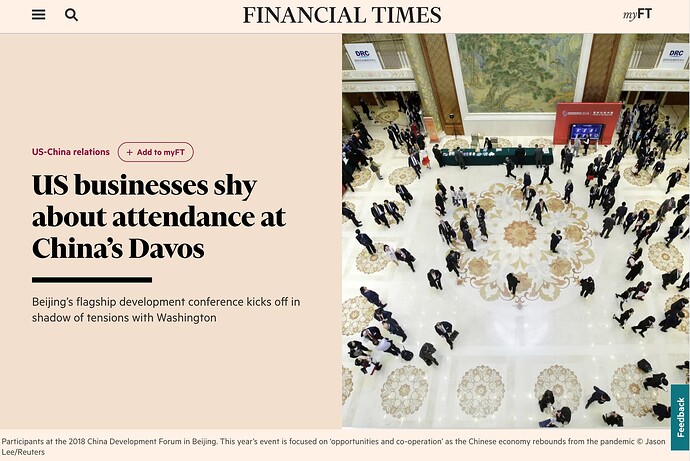-
本周末,前国务卿亨利-基辛格、投资者雷-达利欧和几位美国企业负责人,包括宝洁公司的乔恩-莫勒,将出席北京的旗舰投资会议。这次活动的重点是在中国经济从大流行病中恢复时的 “机会和合作”,但美国在中国的商业利益所面临的阻力也来自华盛顿。
-
预计政府高级监管人员和政策制定者将出席会议,包括中国内阁首脑李强。小组成员和发言人包括必和必拓首席执行官迈克-亨利、国有中国银行行长刘劲、普华永道全球主席鲍勃-莫里茨、中国石油公司总裁赵东和汇丰银行总裁诺埃尔-奎恩。美国与会者可能会面临国内的审查。
-
Alaris Consultancy驻上海的管理合伙人Francis Bassolino认为,美国与会者将尽其所能 “呆在后台,不受关注”。这可能是由于美国在中国的业务处于不太吉利的时期,美国中西部上空有间谍气球,来自北京的警告,以及国会对中国投资的严格审查。
-
美国商会官员Geoffrey Siebengartner在宣传香港的视频中出现后,成为华盛顿一个专门委员会的焦点。
-
北京在2020年实施了国家安全法,这导致了美国的尖锐批评和大陆外国企业界的孤立。
-
在中国投资的好处曾经超过了风险,然而,企业现在面临着来自国会的更大审查。
-
参议员马克-华纳说,美国私募股权公司更加关注国会的关切。
-
罗兰贝格咨询公司驻上海的全球董事总经理Denis Depoux表示,大家对在中国存在的潜在政治影响更加谨慎。
-
公司必须考虑美国制裁的潜在影响和国会等机构的问题。
-
最近的财报电话会议显示,对地缘政治格局的认识被对中国市场的乐观情绪所调和。
-
空气产品和化学品公司、高露洁-棕榄公司和伊利诺伊工具厂都报告了在中国的积极成果。
-
尽管存在政治局势,但企业对中国的感觉良好。
-
Global Guardian的Dale Buckner说,俄罗斯对乌克兰的入侵导致公司对与中国脱钩的风险进行了 “更真实的对话”,但他没有听说有公司离开中国。
-
德勤2023年的报告建议,企业可以根据脱钩的严重程度,建立多数股份或少数股份的合资企业。
-
报告还说,对于那些能够预见快速变化的公司来说,中国仍然是 “世界上最具吸引力的增长市场”。
-
中国领导人李强说,美国公司在他以前担任上海的负责人时,对中国的未来持乐观态度。
-
李强质疑谁会从与中国脱钩的想法中受益。
-
中国美国商会发现,超过一半的受访公司去年在中国没有盈利,但今年的经济正在朝着正确的方向发展。
-
中国美国商会主席迈克尔-哈特估计,目前全球首席执行官中,有一半人因为大流行病而没有到过中国。
-
他说,中国发展论坛将很重要,可以看到与会的欧洲和美国首席执行官们会带走什么信息。
-
This weekend, former secretary of state Henry Kissinger, investor Ray Dalio, and several American business chiefs, including Jon Moeller of Procter & Gamble, will attend Beijing’s flagship investment conference. The event is focused on “opportunities and co-operation” as the Chinese economy rebounds from the pandemic, but the headwinds facing US business interests in China are also coming from Washington.
-
Senior government regulators and policymakers are expected to attend the conference, including China’s cabinet head Li Qiang. Panel participants and speakers include BHP chief executive Mike Henry, state-owned Bank of China president Liu Jin, PwC global chair Bob Moritz, Chinese oil company Sinopec president Zhao Dong, and HSBC chief Noel Quinn. US attendees are likely to face scrutiny at home.
-
Francis Bassolino, managing partner at Alaris Consultancy in Shanghai, believes that US attendees will do what they can to “stay in the background and out of the limelight.” This could be due to the less-than-auspicious time for US business in China, with spy balloons over the American Midwest, warnings from Beijing, and intense congressional scrutiny of investment in China.
-
Geoffrey Siebengartner, an American Chamber of Commerce official, was the focus of a select committee in Washington after appearing in a video promoting Hong Kong.
-
Beijing imposed a national security law in 2020, which led to sharp criticism from the US and isolation of the mainland foreign business community.
-
The benefits of investing in China used to outweigh the risks, however, companies now face greater scrutiny from Congress.
-
Senator Mark Warner said US private equity firms are paying more attention to Congress’ concerns.
-
Denis Depoux, a Shanghai-based global managing director at consultancy Roland Berger, suggested that everyone is more cautious on potential political implications of presence in China.
-
Companies must consider the potential impacts of American sanctions and questions from bodies like Congress.
-
Recent earnings calls show that awareness of the geopolitical landscape is tempered by optimism over the Chinese market.
-
Air Products & Chemicals, Colgate-Palmolive, and Illinois Tool Works have all reported positive results in China.
-
Companies feel good about China, despite the political situation.
-
Dale Buckner of Global Guardian said that the Russian invasion of Ukraine had caused companies to have “more real conversations” about the risks of decoupling with China, but that he was unaware of any companies leaving the country.
-
Deloitte’s 2023 report suggested that companies could establish joint ventures with either majority or minority shares, depending on how severe the decoupling was.
-
The report also said that China remains “the most attractive growth market in the world” for those companies able to anticipate rapid change.
-
Chinese leader Li said that American companies were optimistic about the future of China in his former role as head of Shanghai.
-
Li questioned who would benefit from the idea of decoupling with China.
-
The American Chamber of Commerce in China found that more than half of companies polled were not profitable in China last year, but that the economy is going in the right direction this year.
-
Michael Hart, president of the American Chamber of Commerce in China, estimated that half of the current crop of global chief executives had not been to China due to the pandemic.
-
He said that the China Development Forum would be important to see what message the European and US CEOs in attendance would take away.
